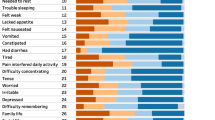Abstract
Objective
To establish questionnaire scaling and reliability and examine the clinical and psychometric validity of the quality of life assessment based on Traditional Chinese Medicine for advanced gastric cancer (QLASTCM-Ga).
Methods
The QLASTCM-Ga was developed based on programmed decision procedures with multiple nominal and focus group discussions, in-depth interview, pretesting and quantitative statistical procedures. The questionnaire was administered to 240 patients diagnosed with advanced gastric cancer before and after treatment. Structured group methods were employed to establish a general and a specifific module respectively. The psychometric properties of the scale were evaluated with respect to validity, reliability and responsiveness.
Results
The three identified scales of the QLASTCM-Ga and the total score demonstrated good psychometric properties. Test-retest reliability of the total scale and all domains ranged from 0.90 to 0.94, and internal consistency ranged from 0.86 to 0.93. Correlation and factor analysis demonstrated good construct validity. Signifificant difference in the subscales and the total score were found among groups differing in traditional Chinese medicine syndrome, supporting the clinical sensitivity of the QLASTCM-Ga. Statistically signifificant changes were found for each scale and the total score. Responsiveness was also good.
Conclusions
The QLASTCM-Ga demonstrates good psychometric and clinical validity to assess quality of life in patients with advanced gastric cancer undergoing traditional Chinese medicine therapy. This study is an important fifirst step for future research in this area.
Similar content being viewed by others
References
WHO. Are the number of cancer cases increasing or decreasing in the world? 2008: WHO Online Q&A.
Siegel R, Ward E, Brawley O, Jemal A. Cancer statistics. Cancer J Clin 2011;61:212–236.
Ferlay J, Shin HR, Bray F, Forman D, Mathers C, Parkin DM. Estimates of worldwide burden of cancer in 2008: GLOBOCAN 2008. Int J Cancer 2010;127:2893–2917.
Zhao L, Shen ZX, Luo HS, Yu JP. Clinical investigation on coexisting of duodenal ulcer and gastric cancer in China. Int J Clin Pract 2005;59:1153–1156.
Garland SN, Pelletier G, Lawe A, Biagioni BJ, Easaw J, Eliasziw M, et al. Prospective evaluation of the reliability, validity, and minimally important difference of the functional assessment of cancer therapy-gastric (FACT-Ga) qualityof-life instrument. Cancer 2011;117:1302–1312.
Huang CC, Lien HH, Sung YC, Liu HT, Chie WC. Quality of life of patients with gastric cancer in Taiwan: validation and clinical application of the Taiwan Chinese version of the EORTC QLQ-C30 and EORTC QLQ-STO22. Psycho-Oncol 2007;16:945–949.
Kobayashi D, Kodera Y, Fujiwara M, Koike M, Nakayama G, Nakao A. Assessment of quality of life after gastrectomy using EORTC QLQ-C30 and STO22. World J Surgery 2011;35:357–364.
Blazeby J, Conroy T, Bottomley A, Vickery C, Arraras J, Sezer O, et al. Clinical and psychometric validation of a questionnaire module, the EORTC QLQ-STO 22, to assess quality of life in patients with gastric cancer. Eur J Cancer 2004;40:2260–2268.
Xu W, Towers AD, Li P, Collet JP. Traditional Chinese medicine in cancer care: perspectives and experiences of patients and professionals in China. Eur J Cancer Care 2006;15:397–403.
Kuyken W, Orley J, Power M, Herrman H, Schofield H, Murphy B. The World Health Organization quality of life assessment (WHOQOL): position paper from the World Health Organization. Soc Sci Med 1995;41:1403–1409.
Patwardhan B, Warude D, Pushpangadan P, Bhatt N. Ayurveda and traditional Chinese medicine: a comparative overview. Evid-based Complem Alternat Med 2005;2:465–474.
Haynes SN, Richard DCS, Kubany ES. Content validity in psychological assessment: a functional approach to concepts and methods. Psychol Assess 1995;7:238–247.
Ullman JB, Bentler PM, eds. Structural equation modeling. Handbook of psychology. John Wiley & Sons, Inc. 2003.
Henson RK. Understanding internal consistency reliability estimates: A conceptual primer on coefficient alpha. Measure Evaluat Counsel Devel 2001;34:177–189.
Bland JM, Altman DG. Statistics notes: Cronbach’s alpha. BMJ 1997;314:572.
Husted JA, Cook RJ, Farewell VT, Gladman DD. Methods for assessing responsiveness: a critical review and recommendations. J Clin Epidemiol 2000;53:459–468.
Fayers PM, Aaronson NK, Bjordal K, Grønvold M, Curran D, Bottomley A. EORTC QLQ-C30 scoring manual. European Organization for Research and Treatment of Cancer Brussels. 2001.
Author information
Authors and Affiliations
Corresponding author
Additional information
Supported by the National Basic Research Program of China (No. 2006CB504604), the Key Discipline and Science & Technology Innovation Fund of Guangdong Medical College (No. STIF201119), the Natural Science Foundation of Guangdong Province (No. S2012040006254), and the Research Fund of Guangdong Medical College, China (No. B2011028)
Rights and permissions
About this article
Cite this article
Quan, P., Zheng, Py., You, Sf. et al. Clinical and psychometric validation of the quality of life assessment system for advanced gastric cancer based on traditional Chinese medicine. Chin. J. Integr. Med. 22, 581–588 (2016). https://doi.org/10.1007/s11655-016-2465-6
Received:
Published:
Issue Date:
DOI: https://doi.org/10.1007/s11655-016-2465-6




